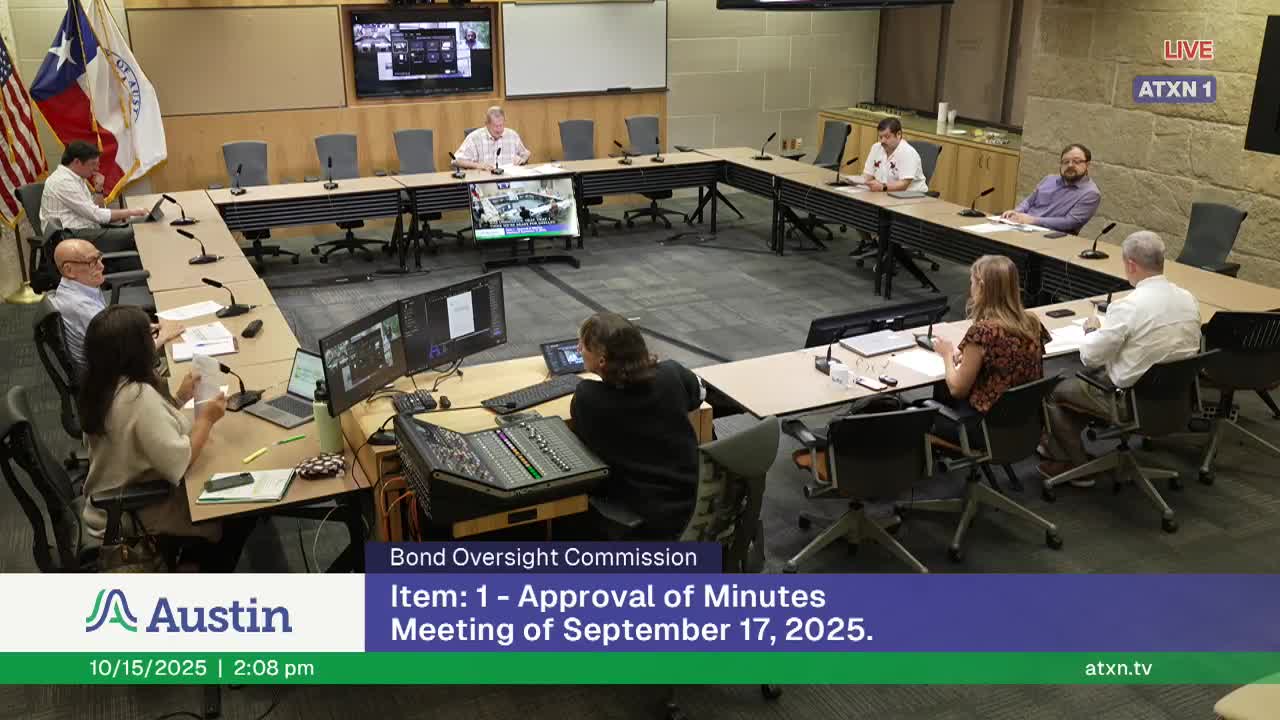Bond Oversight Commission seeks firmer baselines, better project tracking ahead of 2026 bond program
Get AI-powered insights, summaries, and transcripts
Subscribe
Summary
City of Austin staff briefed the Bond Oversight Commission on how projects funded by voter-approved bonds are appropriated, tracked and reported; commissioners pressed for fixed baselines, clearer spend-plan reporting and faster access to consolidated project schedules and change-control information ahead of the 2026 bond cycle.
The City of Austin Bond Oversight Commission heard a staff briefing on capital-program reporting and tracked project delivery systems and pressed for clearer baselines and consolidated reporting to help the commission spot projects slipping in time or cost.
Shelly Kilday of Austin Financial Services led the presentation on the city’s capital budget documents, the capital improvement plan (CIP) and public tools such as Capital Projects Explorer, OpenBudgetATX and BondsATX. Kilday explained the city’s practice of appropriating all bond-authorized projects after a successful bond election and using reimbursement resolutions so project spending may begin before bonds are sold. “The appropriation plus the reimbursement resolution ... allows projects to begin and get funded later,” Kilday said, noting bonds are generally sold within 18 months after initial spending to reduce interest costs.
Commissioners and staff discussed the city’s six-year target for bond program planning and the five-year spending forecasts that appear in the CIP. Commissioner Charles Curry said the commission’s oversight role should include comparing planned spending to execution. “One of the things that we’re supposed to be doing ... is exercising oversight to make sure that projects are completed on time and presumably on budget,” Curry said.
The conversation focused on two gaps commissioners want addressed: (1) the city lacks a consistently maintained, fixed baseline against which to measure actual progress across multi-year programs, and (2) reporting is fragmented because many departments manage subsets of bond projects and use different tools. Staff acknowledged that project-level monitoring is done internally — project managers compare actuals to annual spend plans — but there is not yet a single city‑wide dashboard that rolls every department’s schedule and spending into one consolidated baseline for portfolio-level oversight.
Staff described the long-running project-management tool eCapri as the system that historically contained schedule benchmarks for projects, but commissioners and staff said eCapri’s data and use are inconsistent. City staff said the city is implementing a replacement project-management platform (referred to as PMWeb in the discussion) in a multi-year rollout; enhanced scheduling capabilities are planned but will not be fully available immediately. “We’re at the end of the first year of a five-year implementation plan,” a city staff member said. Staff estimated the scheduling module that will support granular baselines will come later in the rollout, roughly toward the end of year two or the start of year three, though basic reporting improvements are expected earlier.
Commissioners raised examples of how scope changes and citizen-driven adjustments during design and outreach can push projects off the planned schedule and increase cost, citing Doherty as a project that encountered scope additions that were not matched with new bond funding. Staff noted the city builds contingencies into projects and uses a change-control framework managed by procurement; any change that requires additional appropriation would be vetted and, if necessary, taken to City Council for approval. Staff also agreed to explore providing the commission with existing internal reports — for example, budget-versus-actual and change-order summaries — rather than creating entirely new reports.
On procedural items, the commission discussed next steps for the 2026 Bond Election Advisory Task Force (BTF). Staff said the BTF’s materials and working-group content are available online and noted two in-person public hearings were planned for November, including one at the Gus Garcia Recreation Center. Staff also proposed a slimmed 2026 meeting schedule for the commission that would combine mandatory charter items with focused departmental updates (Transportation and Public Works, Parks, and Economic Development are expected presenters in coming months). Commissioner input will determine whether the commission submits a monthly or compressed calendar to the City Clerk by the November deadline.
The commission recorded one formal action at the meeting: approval of the prior meeting minutes. The chair called for a motion and for members to indicate assent; the chair then stated the minutes were approved unanimously.
Commissioners asked staff to return with more concrete examples of reporting and to invite procurement and department representatives to explain the change-control process and the triggers that would require council approval for scope or funding changes. Staff agreed to arrange presentations from departments that manage ongoing bond-funded projects at the commission’s next meetings.
